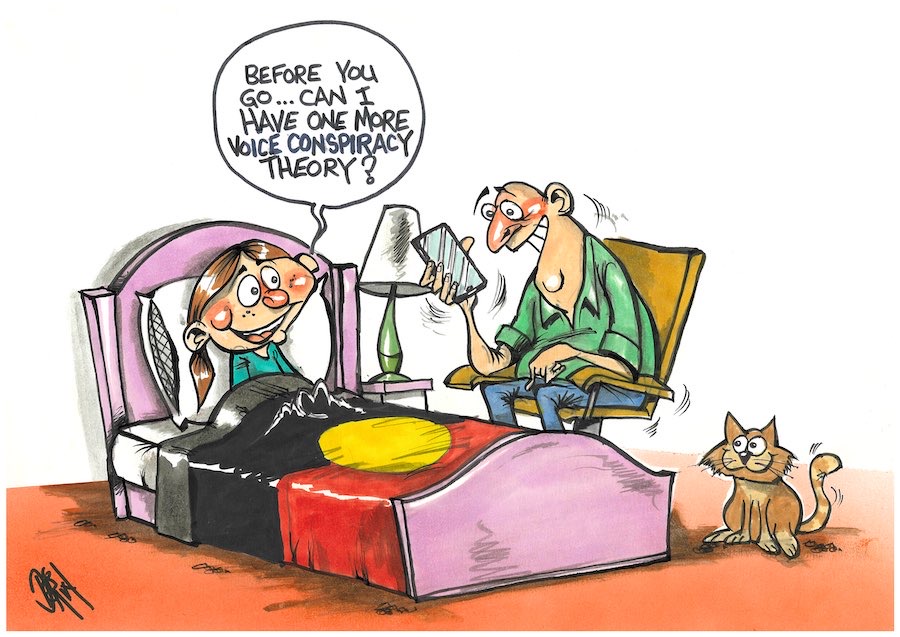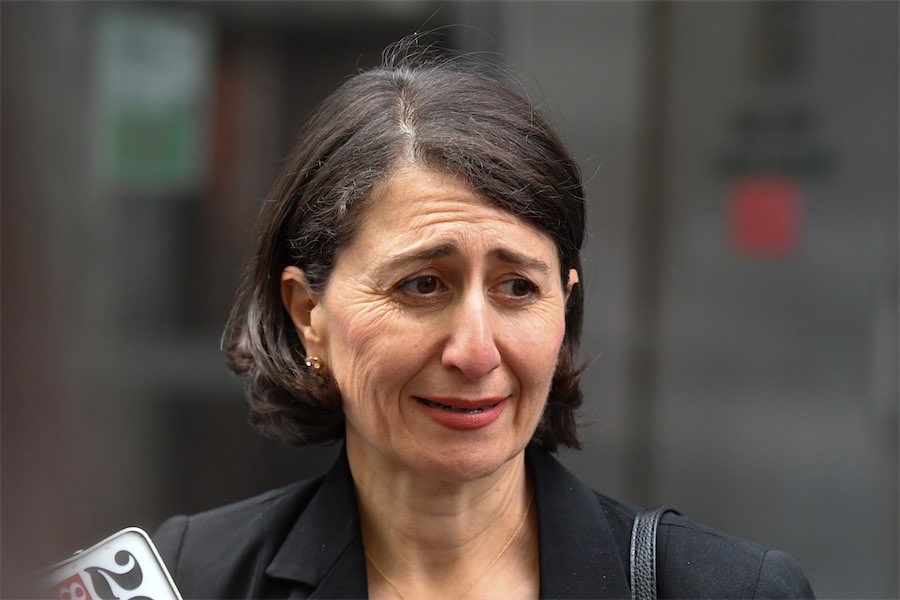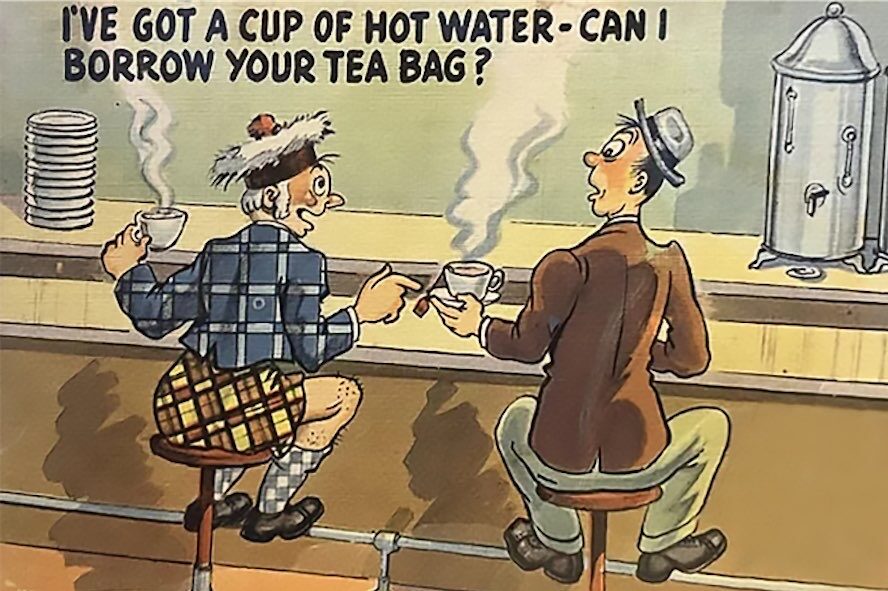
In our final post of letters debating the issue of the Voice, DAVID JENKINS, of Casey, asks why shouldn’t we recognise the long indigenous history of places, “particularly when so many are currently named after absentee imperial overlords”.
THE serial haranguing by the “usual suspects” advocating a “no” vote in “CityNews” has become ever increasingly shrill and unhinged, replete with conspiracies, red herrings and deflections.

In fact, anything to avoid addressing how to improve the lives of indigenous Australians other than by continuing with the manifest failure involved in doing more of what we’ve already been (or not been) doing for decades.
Possibly one of the most risible lately came from Greg Cornwall (Letters CN September 19) who has become weirdly exercised by the dual naming of places. Strangely, he seemed either unbothered by, or oblivious to, the irony of his living in Yarralumla.
So, no, Greg, an enshrined Voice would not be able to demand anything, let alone that “all non-Aboriginal names in Australia”, incredibly down to street names in Greg’s fevered imaginings, be dual named.
The absurdity of that proposition seems not to have registered given the inherent hysteria symptomatic of much of the “no” ravings.
But if indeed some prominent sites are dual-named now or in future, so what? Why shouldn’t we tap into and recognise the long indigenous history of places, particularly when so many are currently named after absentee imperial overlords, others with no obvious connection to the places named after them or people of since-revealed culpability, and when there is instead a linguistic poetry to many indigenous names.
As for K’Gari, it is NOT a dual name; it IS K’Gari, its traditional name. It is fitting that that island no longer be named to honour the odiously treacherous Eliza Fraser who repaid the then-inhabitants who had sheltered, fed and protected her with betrayal.
That previous name seems a perfect encapsulation of everything that was wrong with colonial place naming.
David Jenkins, Casey
You should know better, Greg
I REFER to Greg Cornwall’s letter regarding the Voice and his point about the Voice possibly resulting in demands for all non-Aboriginal names in Australian cities, towns, suburbs, etcetera be dual named (CN September 21.)
What a load of rubbish. Mr Cornwall should know better in regards to the processes of re-naming such places – usually not the national parliament.
And he needs to reflect on the fact that places, geographical sites etcetera were named by the indigenous peoples of this land thousands of years before settlement by Europeans and were renamed by colonists without any reference or permission from the original inhabitants.
Trish O’Connor, via email
No-sayers accept misinformation from any source
AT my Melbourne technical college we studied a text titled “Clear Thinking”.
It was about using reliable evidence to develop reasoned and logical conclusions and possible solutions that, following implementation, can be accurately evaluated.
I wonder how many No-sayers apply clear thinking or anything like it? They accept misinformation from any source they think bolsters their pre-determined, often contradictory and increasingly bizarre opinions. For instance, Senator Price’s assertion that there are no ongoing negative effects of colonisation, or Dutton suggesting the highly reputable Electoral Commission risks a “dodgy” referendum result by sometimes allowing a tick instead of a written “Yes”.
What’s really bemusing is that all sorts of misinterpretations are being placed on our “Westminster system’’ by the same people who, I imagine, are usually its most vocal supporters.
No-sayers seemed to have forgotten that the parliament comprises a government, an opposition and usually some minor parties and independents. All have opportunities to scrutinise draft bills, debate their viewpoints and suggest amendments before voting on the final version. There can’t be any hidden “demands” nor will it open the “floodgates of litigation”.
No-sayers have already decided (again evidence free) the Voice will make no difference to existing problems. Yet, none of the leading dissenters have yet articulated a clear picture of what they would do, or have done, to reduce continuing indigenous disadvantage.
What did Senator Price actually achieve during her five years as an Alice Springs councillor or since as a senator? How have Warren Mundine or Lidia Thorpe significantly improved indigenous wellbeing? All Mr Mundine seems to have done is swiftly change his political allegiances when he thought it would advance his self-interest. And, I wonder, if “Yes” prevails, will any of them jump in to help make the Voice work?
Eric Hunter, Cook
‘Yes’ means a ‘third chamber’ of parliament
IT amazes me that the prime minister and many politicians, especially of the left, have pushed so hard on the referendum issue.
It makes me suspicious of their motives as they seize a chance for a major change to Australia’s governance.
The heat and emotion of the current debate convinces me that, in the case of a “Yes” vote, there will be demand for the Voice to effectively become the equivalent of a “third chamber” of Parliament.
The Voice supposedly will be small (perhaps 24 places), spread across the states, and likely to be “hand-picked”. Any election would require an electoral roll, raising the challenge of criteria for “Aboriginality”.
I have specific concerns about the Voice. In the NT, Aboriginal domestic violence is appalling. I’m also aware of the deep divisions in Tasmania, where one family dominates its Aboriginal groups, refusing to recognise the Aboriginality of a majority of Tasmanians of Aboriginal descent.
Until things change in the NT and in Tasmania, I’m unable to support the Voice.
John L Worcester, Narrabundah
Surely all racists are inherently stupid
I ADMIT to being ignorant about a lot of things. I also feel stupid when I really should know the facts about a topical issue, especially one that is important to me – like a referendum to change the constitution.
To remain wilfully ignorant is “just sheer stupidity” as Prof Marcia Langton puts it. Thankfully, not all stupid people are racist, but surely all racists are inherently stupid. Being so doggedly determined to remain wilfully ignorant of any facts that may risk changing their racist world-view.
Now can someone explain how the “No” case in the referendum booklet was put together? It reads like something out of Utopia where there’s a mad panic to make the deadline while struggling with the 2000-word limit.
Then the work experience kid suggests using an AI engine (like ChatGPT). The first draft looks too perfect so someone decides it needs “fixing” to appear like it was actually written by just stupid humans.
Michael A Crowe, Hawker
Question misleading by deliberate omission
KEL Watt (Letters, CN September 21) is correct in respect of valid ticks but invalid crosses on the Voice ballot paper, now upheld by the High Court.
Past practice, 20 plus years ago, is no excuse to continue an unfair practice.
However, valid ticks but invalid crosses are just the last of several unethical measures by the prime minister to stack the case against the “No” campaign – initially, tax deductions only for “Yes” camp; initially, no “Yes” and “No” pamphlets: initially, no solicitor-general’s advice to be published and no equal government funding of both cases, as in past referenda.
But worst of all, a single question on the ballot paper that addresses only the first of three parts to be written into the Constitution, ie, “A proposed law to alter the Constitution to recognise… the Voice. Do you approve of this proposed alteration?”
Unfortunately, a great many voters will simply read this as “Do you agree with recognition of Aborigines in the Constitution?”, in complete ignorance of the ramifications of implementation. No other information will be provided on the ballot paper and the question is therefore misleading by deliberate omission.
As has been said, the standard you walk past is the standard you accept.
Max Flint, Erindale
Who can be trusted?
In a world of spin and confusion, there’s never been a more important time to support independent journalism in Canberra.
If you trust our work online and want to enforce the power of independent voices, I invite you to make a small contribution.
Every dollar of support is invested back into our journalism to help keep citynews.com.au strong and free.
Thank you,
Ian Meikle, editor





Leave a Reply